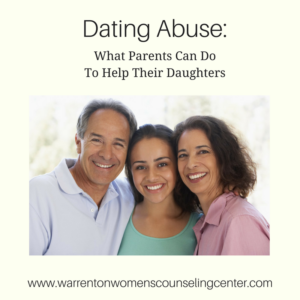Dating Abuse: What Parents Can Do To Help Their Daughters

For parents of daughters, there’s not much that strikes as much fear into our hearts as does the prospect of our girls beginning to date. The trope of a man cleaning his gun as a young man comes to pick up his daughter for a date may be for laughs, but for many of us, there really is a deep desire to protect our girls. And although the reality of them growing up and dating may be a lot to handle, the truth is that dating abuse is all too prevalent and is an additional challenge that parents need to be aware of.
An estimated 1 in 3 high school students experience some form of dating abuse, which can be physical, verbal, emotional or sexual. 1.5 million high school students nationwide experience physical abuse from a dating relationship, and 1 in 10 students have been intentionally hit, slapped or physically hurt by a boyfriend or girlfriend. Statistically, girls and young women between the ages of 16 – 24 experience the highest rate of intimate partner violence.
So as parents, what can we do? How can we help them pick healthy dating partners and make sure they stay safe and respected in their relationships? Here are some strategies for parents to help their daughters avoid dating abuse:
Know The Signs of Dating Abuse
s
If you daughter ever was in an abusive dating situation, would you even be able to tell? Does she seem isolated or withdrawn? Depressed or especially vulnerable and sad? Is she overly attached to her phone (even more so than usual) to text/call a boyfriend? Is she only spending time with him and neglecting other friends or activities? Has her school performance begun to suffer? Any of these can be signs that your daughter may be struggling with some form of dating abuse. We’re all busy people, but make sure you’re emotionally tuned in enough to detect any of these sorts of changes that may indicate that there’s a problem.
Model Healthy Relationships
s
From the time that they are very young, children pick up clues from their family environment about how relationships should look. In your home, are your daughters observing individuals acting with respect and kindness toward one another? Do they feel safe and valued? Do they know healthy and effective ways to handle conflict? Girls and women who have been exposed or victimized by toxic relationships are more likely to continue this pattern in their personal relationships, so although no family is perfect, work to model healthy relationships so that your daughters will internalize the message that they deserve to be treated well by others
Talk About It
s
Patterns of abuse are often established during the adolescent years, so it’s good to begin early having age-appropriate conversations with your daughter about what is and what is not a healthy relationship. These conversations should be casual in nature, meaning that if you see an ad or a scene in a movie, you can use it as a starting point for a conversation about healthy relationships. Tell her that she is worthy of respect and kindness from other people, and that if she ever feels like she is being mistreated, she can come to you to talk about it.
Insist On Knowing Her Social Circle & Dating Partners
s
The peer pressure that teenagers experience may mean that your daughter doesn’t want you to know who she’s spending time with. If this is the case for you, resist the temptation to be seen as “the cool parent” if it comes at the expense of your daughter’s well-being. This is your child! When it comes to her dating life, it’s okay to be a little on the side of overbearing. I’m not suggesting you never give your daughter privacy or autonomy, but as a young woman who may still be learning boundaries and social etiquette, she desperately needs her parents to be involved and know what’s going on (whether she knows its or not!).
Empowering Families By Strengthening Girls & Women
At Warrenton Women’s Counseling Center, we work with girls of all ages (teenagers, adult women, mothers, and daughters). Our work is done face-to-face, online or via phone. We would love to hear from you and help to empower you and/or your daughter.
_______________________________________________________________________________

Michelle Kelley, LCSW is a licensed counselor and owner of Warrenton Women’s Counseling Center. We work with girls and women of all ages. Our motto is to empower families by strengthening girls and women. For more information call (540) 316-6362 or email Michelle@WarrentonWomensCounselingCenter.com


